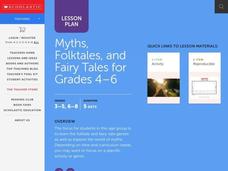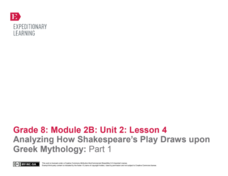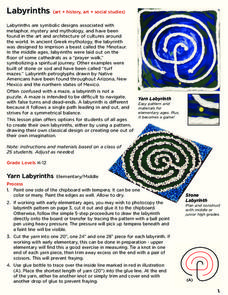Curated OER
Great Women in Mythology
Take a closer look at the women in myths around the world. Some are goddesses, some are mortal. Test your readers with ten multiple-choice and fill-in-the-blank questions.
Curated OER
Greek Mythology in Art
Fifth graders recognize the specific mythological characters and their significance to Greek citizens, create representations of some gods and goddesses, and explore mythology as an attempt by earlier civilizations to explain natural...
Curated OER
Three of Myth's Tragic Romances
Roman mythology is full of tragic love stories. A multiple-choice quiz highlights three major partnerships, and explores the problems that led to sad endings. Test your learners with these multiple-choice questions after studying Roman...
Have Fun Teaching
Compare and Contrast Greek Myths (4)
How are Icarus and Prometheus similar? How are they different? Compare any two Greek myths with a graphic organizer, which provides space for kids to fill in the ways that the myths are like and unlike each other.
Curated OER
Myths, Folktales, & Fairy Tales
Srtudents explore the folktale and folklore genres as well as the world of myths. They read myths and folktales to increase knowledge of world cultures and traditions and follow the writing process to create writing in different genres.
Curated OER
Mythology Study Guide
For this literature worksheet, students respond to 20 short answer and essay questions about noteworthy myths. Students may also link to an online interactive quiz on the novel at the bottom of the page.
Spark Notes
Mythology by Edith Hamilton: Study Guide - Mini Essays
In this online interactive literature worksheet, students respond to 9 short answer and essay questions about Edith Hamilton's Mythology. Students may check some of their answers online.
EngageNY
Connecting Literary and Informational Texts: Cronus and “The Key Elements of Mythology”
Is there a connection? Scholars work to make connections between Myth of Cronus and The Key Elements of Mythology. First, they circle important words in the text and look for similarities. They then revisit the concept of theme and...
EngageNY
Connecting the Theme of the Expert Group Myth to a Theme in The Lightning Thief and to Life Lessons
Expert groups discuss the theme of their myths and the life lessons people learn from it. They then regroup their triads so that there is a pupil from each expert myth group and share details about their myths. The class also talks about...
Activated Story Theatre
Orpheus- A Greek Myth: Reader's Theatre Script
Is this any way to treat a Greek Myth? By all means, turn the tale of Orpheus into a reader's theatre exercise.
EngageNY
Building Background Knowledge: The Myth of Cronus
Scholars look at and describe a picture of Cronus and Rhea and discuss the process of making predictions. Learners then use the images to write a prediction about the myth of the gods on an index card before completing guided reading...
EngageNY
Using Details to Determine Theme: The Myth of Cronus
There's nothing like a good theme! After reviewing the story of Cronus, learners participate in a mini instructional activity about theme by pulling papers from an envelope and identifying the writing on it as either a topic or a theme....
EngageNY
Building Vocabulary: Working with Words about the Key Elements of Mythology
Build vocabulary one word at a time. Scholars work to create word models to describe the key elements of myths. After viewing and discussing glossaries, they begin working in triads on their models that include the word, synonyms,...
EngageNY
Analyzing How Shakespeare’s Play Draws upon Greek Mythology: Part 1
Scholars read the story "Pyramus and Thisbe," analyzing word choice, tone, and meaning. They then try to find the gist of the story and discuss how Shakespeare used the myth in his play A Midsummer Night's Dream.
EngageNY
Analyzing How Shakespeare’s Play Draws upon Greek Mythology: Part 2
Pupils explore the narrative structure of a piece of literary text, mapping out the plot structure of the Greek myth "Pyramus and Thisbe." Next, they use their completed graphic organizers to write story summaries.
EngageNY
Analyzing How Shakespeare’s Play Draws upon Greek Mythology: Part 3
How do the narrative and play versions of the myth "Pyramus and Thisbe" affect meaning? Scholars reread Act 5, Scene 1 from Shakespeare's A Midsummer Night's Dream and compare its structure to "Pyramus and Thisbe." Next, they use a...
EngageNY
Building Background Knowledge: Close Reading Part 2 of “Shrouded in Myth”
That was a good talk. Scholars learn about how to conduct a good discussion. They use chart paper and markers to record and discuss expectations for members when working in a group. They then take a look at vocabulary in Shrouded in...
Curated OER
The Legendary Raptors
How are raptors and airplanes alike? Combine science and language arts in this fun and interactive project. Young scientists research the animal in order to design their own aircraft, and compete in a contest for farthest, fastest, and...
Curated OER
Labyrinths
Whether studying metaphors or Greek mythology, this labyrinth project is a fantastic lesson plan to add to your unit. It includes two versions of the labyrinth; making it with yarn or stone. If your materials are limited, you can even...
Curated OER
Pregnancy
Dispel the many myths and misunderstandings for teens regarding pregnancy. Health students discuss the reproductive system, how conception occurs, and review new information through an excellent in-class game. Some wonderful blackline...
Curated OER
Chinese Mythology
Seventh graders examine creation myths of China, discuss how myths reflect Chinese culture, differentiate between Chinese and Greek creation myths, and explore place of myths in Chinese culture as compared to their place in other...
Curated OER
Writing Myths
Students read and write myths. In this world mythology instructional activity, students read and analyze myths from various cultures and then recognize their attributes as they write their own myths that explain natural phenomena.
Curated OER
A World of Myths
Students read and write myths. In this world mythology lesson, students read and analyze myths from various cultures and then recognize their attributes as they write their own myths to explain natural phenomena.
Curated OER
Myth-try Cards Activity
Students read creation myths to learn various cultural explanations for natural phenomena. They select sharks and write myths to explain physical structures, behaviors or roles in ecosystems. They research the animals to provide...
Other popular searches
- Greek Myths
- Myths and Legends
- Creation Myths
- Myths Fables
- Writing Myths
- Myths of the Sun
- Fables and Myths
- Egyptian Myths
- Comet Myths and Facts
- Cultural Creation Myths
- Greek Myths and Legends
- Raven Myths

























